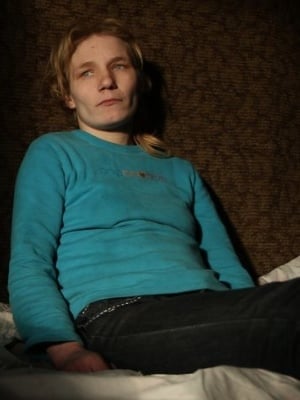Detective documentary Resurrect Dead follows a man's quest to solve the mystery of the Toynbee Tiles. Photos courtesy of Silverdocs
Resurrect Dead: The Mystery of the Toynbee Tiles
At one time, you could find them scattered in over a dozen locations in downtown DC. Hand-cut linoleum tiles baked right into the blacktop, bearing a cryptic message:
Toynbee Idea
In Kubrick’s 2001
Resurrect Dead
On Planet Jupiter
Most of them are gone now, paved over or removed, but they were the same as tiles that appeared in cities throughout the Northeast, parts of the Midwest, and even a few locations in South America. The epicenter was Philadelphia, where the “Toynbee tiles” first appeared in the mid-1980s. When the Internet finally allowed people to realize that the tiles were widespread, many began to share their theories on their meaning and origin. Philly resident Justin Duerr took an obsession with what he previously thought was a local phenomenon and made solving its mystery his primary hobby. Director Jon Foy’s Resurrect Dead documents Duerr’s search, alongside two other Toynbee fanatics, Colin Smith and Steve Weinik.
Detective documentaries, those that themselves attempt to unlock mysteries or follow subjects who do, can be some of the most satisfying to watch; they take the same elements of suspense that drive many narrative films, with the added tension that results from the unpredictability of real life. Resurrect Dead is no exception, and Foy does an excellent job using interviews with Duerr, and some not-too-cheesy reenactments of a few important events in Duerr’s search that occurred before filming began, to give background and speculation about the tiles before jumping into the proper detective work.
There are only a few leads available to them, leads that have been well known to the Toynbee enthusiast community for years. But the trio meticulously chase down each one, and wind up being the first ones to really put together a concrete profile of the person behind the tiles. It would spoil the film’s carefully constructed revelations to say much more on that, but there are times when the story is as close to edge-of-the seat viewing as documentaries usually get.
Foy also attempts to draw parallels between Duerr and the tiler: Both are somewhat eccentric, artistically inclined, and a little obsessive. Duerr understands what drives the tiler, and that is perhaps what allows him to go so much further in the investigation than those who have come before him. The aim is to make Duerr as much the subject of the documentary as the mystery. Foy’s method of making those connections, though, with biographical sections about Duerr that seem disconnected from the rest of the film, are the only clumsy steps in a piece that otherwise deftly brings together a complicated series of clues and events across a 30-year timeline.
The end Foy and Duerr give us may not be the neatly tied solution we’d get out of a narrative version of this story, but that’s the great thing about documentaries: They aren’t obligated to follow normal story conventions. The ending really does become about Duerr and his search and what drives us to want to find answers to riddles to begin with.
Resurrect Dead screens in AFI Silver Theater 2 at 5:15 PM on Friday, June 24, and in AFI Silver Theater 3 at 10:45 PM on Saturday, June 25. Individual tickets and festival passes (prices vary) available at the Silverdocs Web site.

Family Instinct
If you thought the families appearing on Jerry Springer had problems, a Latvian version of the show might make it look tame in comparison. Director Andris Gauja’s documentary on a rural family plagued by poverty, alcoholism, and incest runs just under an hour. But given the harrowing, nakedly shocking subject matter, it might be entirely intolerable if it was any longer. It’s a tough, uncomfortable slog as it is, one that feels like it borders on exploitation at times.
Family Instinct focuses on Zanda, a young woman raising her children in a remote house owned by her mother, populated by a corps of misfit tenants, many of whom seem to have designs on getting into her bed. That bed is empty because Valdis, the father of her children, is doing a stretch of time in jail. Valdis also happens to be her brother.
The nature of how this union came about is unclear, but what is clear is that Valdis is an abusive and controlling presence, sending Zanda angry letters from jail blaming her for his incarceration. She talks about his return in the sad voice of the abused, hoping that when he comes home he’ll still love her as much as she says she loves him.
Social workers attempt to help her out of the situation, even at one point offering to set her up in a nice new apartment. She turns them down and returns to the squalor back home. The list of jaw-dropping transgressions there are almost too numerous to be believed. I lost count of how many people are shot passed out on the floor or the ground from too much drink. One neighbor enters Zanda’s apartment covered in blood, a rusty utility knife or corkscrew of some kind embedded in his chest. She beats another neighbor severely and nearly tosses him into an outdoor fire trying to extract money for an electric bill. One scene involves a depiction of animal negligence so cruel that one has to question the morality of the filmmaker in sitting idly by and allowing it to happen.
It’s in moments like these, where Gauja just looks on dispassionately at awful things happening through the lens, that one feels uncomfortable, and possibly complicit, in even watching these events unfold. As a document of a family in utter chaotic collapse, the film is, I suppose, successful. And there’s no denying the sad beauty of some of the camera work. Though what appear to be multiple camera setups, which allow for editing some scenes more like a narrative film than a documentary, does raise questions as to exactly how spontaneous some of these episodes are. Whether things are manipulated or not, at times this feels like a film that exists for no purpose other than to shock, and even with the brief running time, doesn’t always feel like a journey worth taking.
Family Instinct screens in AFI Silver Theater 3 at 10 PM on Friday, June 24. Individual tickets and festival passes (prices vary) available at the Silverdocs Web site.
Subscribe to Washingtonian
Follow Washingtonian on Twitter
More>> After Hours Blog | Arts & Events | Happy Hour Finder | Calendar of Events


















